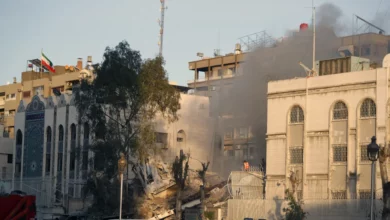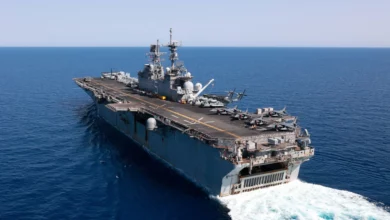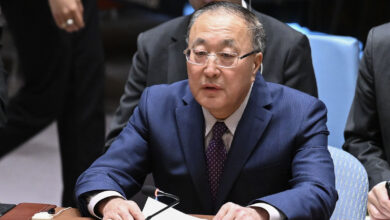Syrian rebels clashed with forces loyal to President Bashar al-Assad in southwest Damascus on Sunday, forcing the closure of the main highway to the southern town of Deraa, activists said.
The fighting came as United Nations humanitarian chief Valerie Amos visited Syria ahead of a UN aid conference which aims to raise US$1.5 billion for millions of people made homeless, hungry and vulnerable by the 22-month-old conflict.
The United Nations says 60,000 people have been killed in the conflict, which started with mainly peaceful protests but spiraled into a civil war in which the mainly Sunni rebels have challenged Assad's control of all Syria's main cities.
In Damascus, the two sides fought around a railway station in the southwestern district of Qadam.
Footage posted on the Internet showed what activists said was a rebel attack on the station. One clip showed plain-clothed gunmen taking cover as gunfire could be heard. Another showed gunmen inspecting buildings by the track after what the narrator describes as the "liberation" of the station.
Another video showed black smoke billowing above concrete buildings, the result of what activists said was an air strike by Assad's air force near the railway terminal.
Syrian media did not comment on the fighting around Qadam and restrictions on independent media make it difficult to verify reports from activists.
The Syrian Observatory for Human Rights, a British-based opposition group which monitors the violence in Syria, said jets and army artillery also struck targets in rebel strongholds to the east and south of the capital after fierce clashes there.
Amos, visiting Damascus ahead of Wednesday's UN pledging conference in Kuwait for Syria's humanitarian crisis, did not speak to reporters before heading for talks at the Syrian Foreign Ministry.
On Wednesday, Amos said Syrians were "paying a terrible price" for the failure of world powers to resolve the conflict, pointing to 650,000 refugees who have fled the country and the millions affected inside Syria.
"Four million people need help, two million are internally displaced and 400,000 out of 500,000 Palestinian refugees have been affected," she told an economic forum in Switzerland.
The United Nations and aid groups inside Syria, including the Syrian Arab Red Crescent, could not keep pace with the rising number of people in need, she said.
"We must find ways to reach more people, especially in the areas we are still unable to get to, and where there is ongoing fighting," she said.
Last month the United Nations withdrew 25 of its 100 foreign aid workers from Syria as fighting intensified around Damascus, but Amos said the organization remained committed to maintaining aid operations.
Most of the money from the Kuwait pledging conference will go to support neighboring countries hosting hundreds of thousands of refugees, while $519 million is earmarked for aid inside Syria.
Meanwhile, Russian Prime Minister Dmitry Medvedev said that Assad's chances of retaining power are getting "smaller and smaller" every day, according to the transcript of an interview with CNN released by Medvedev's office on Sunday.
His remarks were the most vocal Russian statement that Assad's days could be numbered. But he reiterated calls for talks between the government and its foes and repeated Moscow's position that Assad must not be pushed out by external forces.
"I think that with every day, every week and every month the chances of his preservation are getting smaller and smaller," Medvedev was quoted as saying. "But I repeat, again, this must be decided by the Syrian people. Not Russia, not the United States, not any other country.
"The task for the United States, the Europeans and regional powers … is to sit the parties down for negotiations, and not just demand that Assad go and then be executed like [the late former Libyan leader Muammar] Qadhafi or be carried to court sessions on a stretcher like [Egypt's] Hosni Mubarak."
Russia has been Assad's most important ally throughout the 22-month-old Syrian conflict.
Moscow has blocked three UN Security Council resolutions aimed at pushing him out or pressuring him to end the bloodshed. But Russia has also distanced itself from Assad by saying it is not trying to prop him up and will not offer him asylum.
Medvedev made some of Russia's harshest criticism of Assad to date, placing equal blame for the escalation into a civil war on "the leadership of the country and the irreconcilable opposition". He also said Assad was far too slow to implement promised political reforms.
"He should have done everything much faster, attracting part of the moderate opposition, which was ready to sit at the table with him, to his side," Medvedev was quoted as saying. "This was his significant mistake, and possibly a fatal one."
The wording of the interview suggested it was not just Assad's grip on power that was under threat, but his life. Medvedev's remark about the chances of his "preservation" diminishing came when he was asked whether Assad could survive.
Russia has repeatedly called on Western and Arab nations to put more pressure on Assad's foes to seek a negotiated solution, but Medvedev acknowledged that Moscow's influence on the Syrian president is limited.
"I have personally called Assad several times and said: conduct reforms, hold negotiations," said Medvedev, who was Russia's president until last May. "In my view, unfortunately, the Syrian leadership is not ready for this.
"But on the other hand, by no means should a situation be allowed in which the current political elite is swept away by armed actions, because then the civil war will last for decades," he said.
Russia has given frequent indications it is preparing for Assad's possible exit, while continuing to insist he must not be forced out by foreign powers.
Russia sells arms to Syria and uses a naval facility on the Mediterranean coast that is its only military base outside the former Soviet Union.
But analysts say its policy is driven mainly by President Vladimir Putin's desire to prevent the United States from using military force or support from the UN Security Council to bring down governments it opposes.




